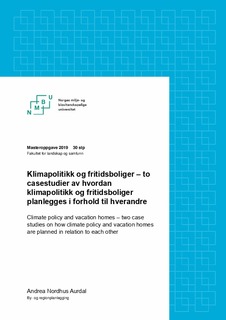| dc.contributor.advisor | Xue, Jin | |
| dc.contributor.advisor | Steffansen, Rasmus Nedergård | |
| dc.contributor.author | Aurdal, Andrea Nordhus | |
| dc.coverage.spatial | Norway | nb_NO |
| dc.date.accessioned | 2019-08-15T08:48:11Z | |
| dc.date.available | 2019-08-15T08:48:11Z | |
| dc.date.issued | 2019 | |
| dc.identifier.uri | http://hdl.handle.net/11250/2608419 | |
| dc.description.abstract | Fritidsboliger er et utbredt fenomen i Norge, men dagens fritidsboligpolitikk er veldig lite diskutert i forhold til dagens klimapolitikk. Dagens klimapolitikk oppfordrer alle kommunene i landet til å kutte klimagassutslipp gjennom planleggingen. Kommuner skal som sådan fokusere på klimatilpasning og tiltak som kutter utslippene. Men det er tydelig at klimapolitikken også må begynne å inkludere fritidsboliger.
Denne oppgaven tar for seg hvordan klimapolitikk og fritidsboliger forholder seg til hverandre på nasjonalt, regionalt og lokalt nivå. En dokumentanalyse og to casestudier benyttes for å gi en dypere forståelse av hvordan ulike institusjonelle forhold påvirker fritids- og klimapolitikkforvaltningen på det lokale nivået. Casene i denne oppgaven er Kristiansand kommune og Søgne kommune. Først vil de nasjonale og regionale føringene for klimapolitikk og fritidsboliger undersøkes og sammenlignes, for så å undersøke hvordan disse temaene samsvarer med det lokale planleggingsnivået. Litteratur og teori om potensiale og barrierer som gjør seg gjeldene for klimapolitikken for kommuner vil bli gjennomgått og sett i sammenheng med case-kommunene, samt teorier om partnerskap og governance.
Den første viktige oppdagelsen som danner et viktig grunnlag for resten av oppgaven er at klimapolitikk og fritidsboligpolitikken er blind til hverandre i de overordnede plandokumentene. Videre tilfører ikke det regionale planleggingsnivået noen ny informasjon som kommunene kan dra nytte av. Som sådan må det lokale planleggingsnivået ut ifra nasjonale retningslinjer tolke hvordan klimapolitikken kan overføres til fritidsboliger. Tolkningen av klimapolitikken og hvordan fritidsboligene forvaltes varierer i case-kommunene, fordi kommunene tolker forskjellig og har ulike prioriteringer. Spesielt barrierene for planlegging av klimapolitikk på det lokale planleggingsnivået er en utfordring å takle.
Resultatet viser at det er store forskjeller i forvaltningen og tilnærmingen av klimapolitikk og fritidsboliger i case-kommunene. Dagens utvikling av fritidsboliger kan ut ifra de klimapolitiske rammene i stor grad baseres på en mangel på oppmerksomhet, mangel på kunnskap og private interessers makt i planleggingen. | nb_NO |
| dc.description.abstract | Vacation homes are a widespread phenomenon in Norway, but today's vacation home policy is hardly discussed in relation to today's climate policy. Today's climate policy encourages all municipalities in the country to cut greenhouse gas emissions through planning. As such, municipalities should focus on climate adaptation and measures that cut emissions. But it is clear that climate policy must also begin to include vacation homes.
This thesis deals with how climate policy and holiday homes relate to each other at the national, regional and local level. A document analysis and two case studies are conducted to provide a deeper understanding of how different institutional conditions affect the leisure and climate policy management at the local level. The cases in this thesis are Kristiansand municipality and Søgne municipality. First, the national and regional policies for climate policy and vacation homes will be explored and compared, then I will examine how these topics match the local planning level. Literature and theory of the potentials and barriers that are applicable to climate policy will be reviewed and seen in the context of the case municipalities, as well as theories on partnerships and governance.
The first important discovery that forms an important basis for the rest of the thesis is that climate policy and the vacation home policy are blind to each other in the overall planning documents. Furthermore, the regional planning level does not provide any new information that the municipalities can benefit from. As such, the local planning level must interpret how climate policy can be transferred to vacation homes. The interpretation of the climate policy and how the holiday homes are managed varies in the case municipalities, because the municipalities interpret differently and have different priorities. In particular, the barriers to effective management of climate policies at the local planning level are a challenge.
The result shows that there are major differences in the management and approach to climate policy and vacation homes in the case municipalities. Today's development of vacation homes can, based on the climate policy framework, largely be based on a lack of attention, lack of knowledge and the power of private interests in planning. | nb_NO |
| dc.language.iso | nob | nb_NO |
| dc.publisher | Norwegian University of Life Sciences, Ås | nb_NO |
| dc.rights | Attribution-NonCommercial-NoDerivatives 4.0 Internasjonal | * |
| dc.rights.uri | http://creativecommons.org/licenses/by-nc-nd/4.0/deed.no | * |
| dc.subject | Klimaendringer | nb_NO |
| dc.subject | Kommunal planlegging | nb_NO |
| dc.subject | Climate change | nb_NO |
| dc.subject | Regional planning | nb_NO |
| dc.title | Klimapolitikk og fritidsboliger : to casestudier av hvordan klimapolitikk og fritidsboliger planlegges i forhold til hverandre | nb_NO |
| dc.title.alternative | Climate policy and vacation homes : two case studies on how climate policy and vacation homes are planned in relation to each other | nb_NO |
| dc.type | Master thesis | nb_NO |
| dc.description.version | submittedVersion | nb_NO |
| dc.source.pagenumber | 87 | nb_NO |
| dc.description.localcode | M-BYREG | nb_NO |

